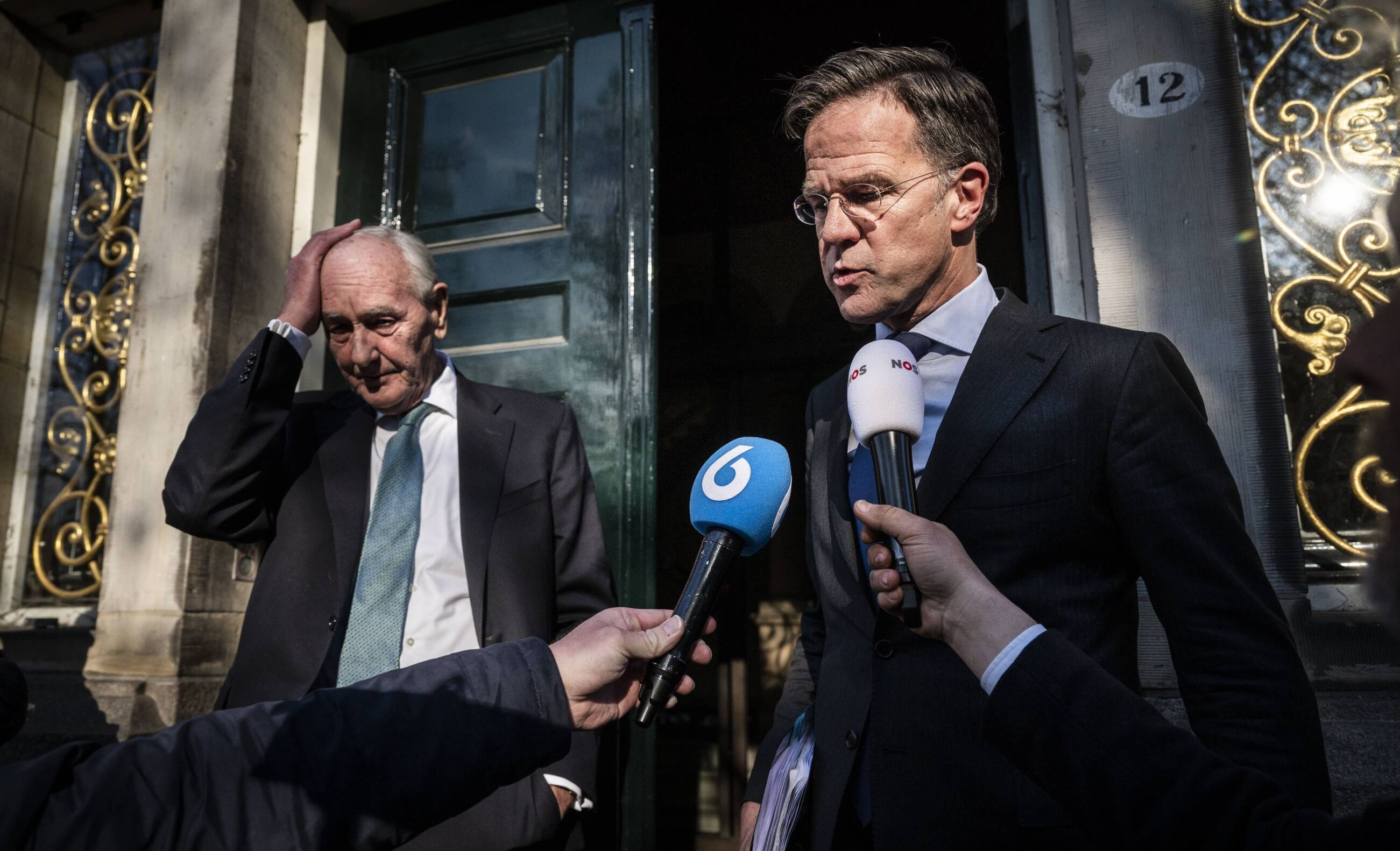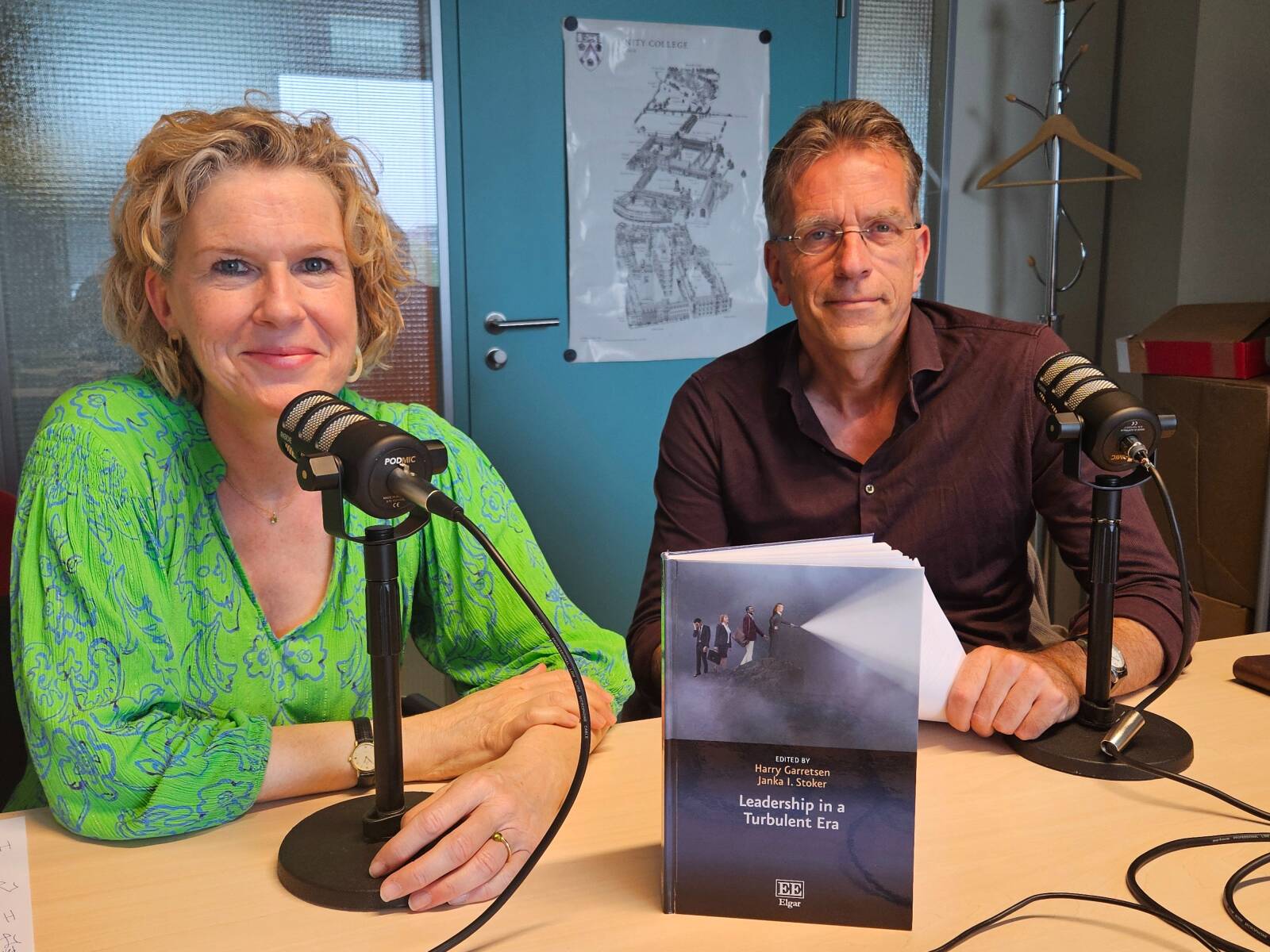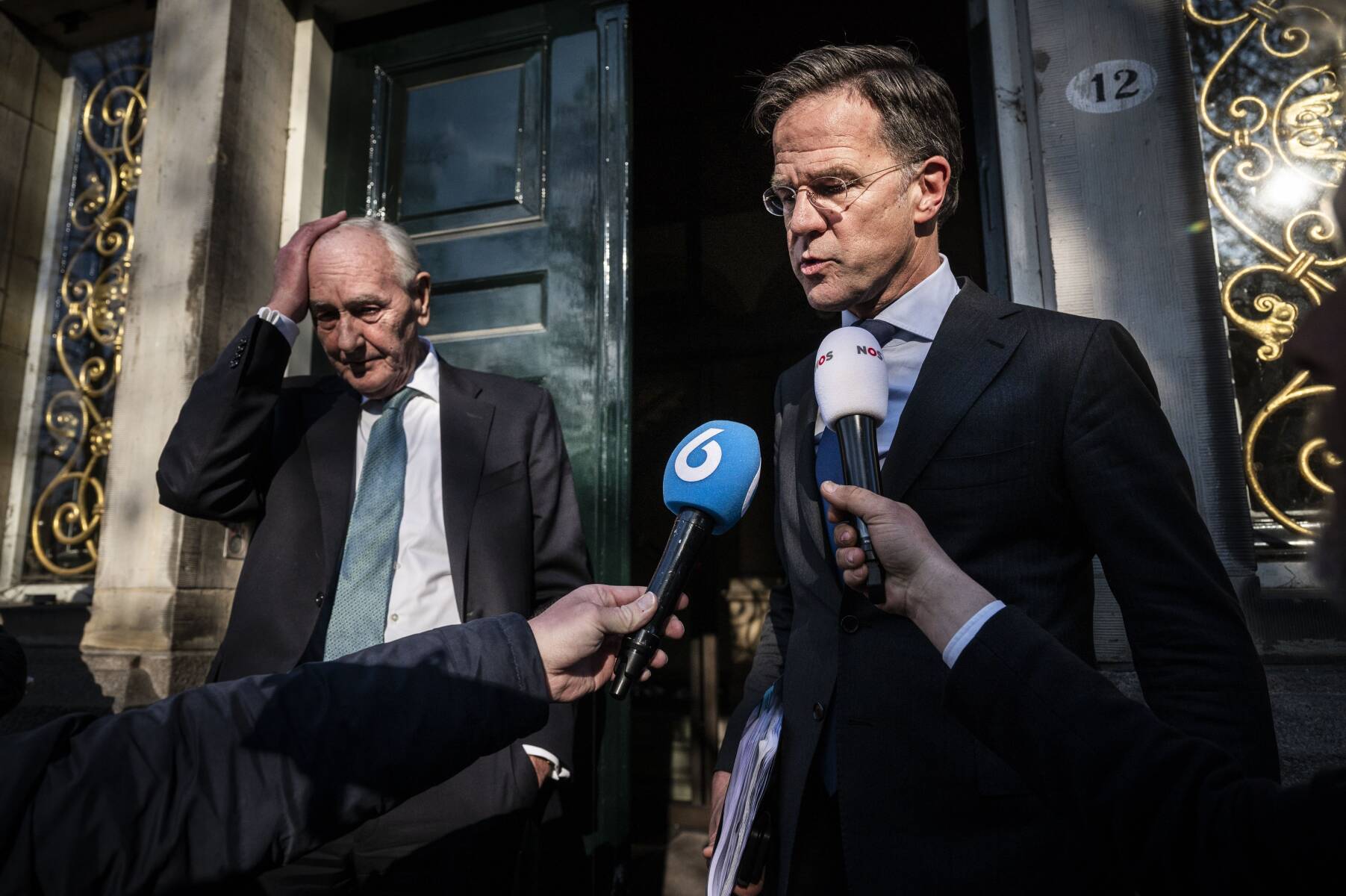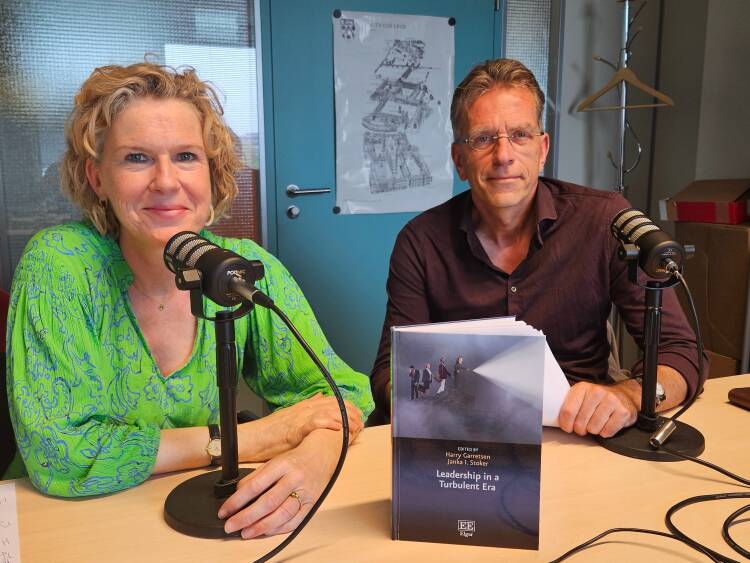

PHOTO: ANP/KEES VAN DE VEEN
Alumnus Johan Remkes and Prime Minister Mark Rutte in front of the Groningen Provincial Government Building, 18 April 2023
‘You can’t blame
the citizens’


PROPOSITION
Denise Madeleine Blom – Faculty of Medical Sciences
Getting a PhD requires the same things as riding a motorbike: balance, endurance and
a helmet to protect you from headaches

I
Harry Garretsen and Janka Stoker produce the podcast series Leiderschap in onzekere tijden
provincial government building in Groningen. Just before the COVID-19 pandemic.
‘For the past six years, we’ve failed to make significant progress on any of the most important issues of our time — sustainability, the nitrogen pollution crisis, problems on the housing market. Whether you’re left or right-wing, everyone can see that these issues need to be resolved. And yet we haven’t come up with any solutions.’
n answer to the question of how we are doing as a country on the eve of yet another general election, Harry Garretsen refers back to the third Rutte cabinet in 2019. It was an era of fierce protests by farmers, flags being hung upside-down, and a tractor being driven into the door to the
TEXT: BERT NIJMEIJER
Renowned UG economist and leadership expert Harry Garretsen (1962) sees a lack of
politicians who are brave enough to make and sell clear decisions. ‘We get bogged down in
bogus solutions.’
Garretsen and fellow-professor Janka Stoker are in charge of In the LEAD, the UG leadership expertise centre. Politicians who dare to make difficult decisions, and sell those decisions, are extremely thin on the ground, he concludes. This is not unique to the Netherlands: you see it in the countries around us too. Wherever you look, politicians are procrastinating about tricky decisions, scared of being ousted by a fickle electorate.
‘Faith in classical centrist parties is in decline,’ Garretsen continues. ‘Forty years ago, CDA and PvdA accounted for over 100 seats in parliament. Fortuyn was the start of fickleness in the electorate. You can make a list of political leaders who soared in popularity, only to fall equally quickly from grace: Verdonk, Baudet, Omtzigt, and now perhaps Ingrid Coenradie, or Henri Bontenbal, who are still unknown quantities. Voters are looking for solace in something new. This something has a huge, but short-lived build-up, and soon collapses when it fails to meet its promises.’
It’s almost as if they’re choosing future disappointments.
‘Yes. We are all in this together. A lot of voters are falling for it. But you can’t lay all the blame at the feet of citizens. There’s also the fact that incumbent politicians seem to find it very difficult to summon up an appealing prospect, one which makes people understand that sacrifices need to be made for the benefit of society as a whole. And yet this is their job.
The nitrogen pollution crisis is a prime example. Johan Remkes wrote two very pointed reports, arguing the case for the reduction of livestock and offering a new perspective. He presented the problem as an issue facing society as a whole, not just the farmers.’
But Remkes does not have to worry about upsetting voters.
‘True, but the striking thing was that people from the left and the right of the political spectrum, who had very little or no faith in the incumbent parties’ position on this problem, did trust him and generally saw his style of leadership as unifying and authentic. The last three cabinets have got bogged down in bogus solutions and made absolutely no progress regarding this subject, or any other during the last
18 months.’
Are politicians letting themselves be hijacked by the large group of voters that leans towards populism?
‘The growth of populism is rooted in dissatisfaction. Irrespective of the question of whether this is right or not: as a politician, you can’t ignore it. And of course, we’re seeing more and more parties that are fuelling populism, which isn’t helping to solve the problems. We need to find the narrow path that provides solutions while also showing understanding. A path that tries to steer around the “us and them” division created by “pity you’ve been left behind, pity you’re farmers” attitudes.
This isn’t the first huge change that the Netherlands, or the West in general, has faced. It’s not as if we’ve never experienced massive transitions in the economic structure or major changes on the housing market.’
And were politicians more able to keep control of these processes in the past?
‘It’s a chicken and egg question. I think that in those days, citizens had more faith in their leaders. Politicians focused more on the content and less on the process, so citizens were more willing to accept measures that didn’t necessarily benefit them personally, but which ultimately made them feel better off with those politicians than without them.’
How has the work of politicians today changed from that of, say, forty years ago?
‘It’s become more difficult. Voters are no longer traditionally loyal to one party. In the past, people voted CDA or PvdA because that’s what they’d always done. Politicians can no longer rely on this type of loyalty. Their target groups don’t take their authority for granted any more. Social media has totally changed the relationship between politicians and voters. We should perhaps ask ourselves just how successful the iconic political leaders of the 1970s and 80s, like Lubbers and Den Uyl, would have been today?’
Do you see these developments going in any particular direction?
‘Events will take their natural course. Whether they like it or not, politicians are being forced to focus on short-term perception, reputation, and political gain, which doesn’t address the root of the problems. Voters are also noticing that this does not get us anywhere.’
In recent years, voters seem to be gradually shifting to the right, irrespective of what politicians do or say. What can the left do about this?
‘They could say: “This is what I think, and if you don’t want to vote for me, don’t”. But this probably isn’t the best strategy if you want to have an impact. You have to take the voters’ concerns seriously.
So your message is: tell them what they want to hear? That sounds very much like populism.
‘Listening carefully to what citizens are saying, and taking their opinions into account in your political considerations, is not the same as putting the will of the people first, which is what populist leaders are trying to do.
The migration issue has caused a shift to the right in several countries. The tactic of downplaying this problem simply isn’t working. In Denmark, the traditional centrists have reclaimed the migration issue from the right by taking their own fairly drastic measures to restrict migration and introducing strict conditions relating to integration. In Denmark, the parties we consider to be right wing extremists now have fewer followers because the migration problem is being addressed by the political centre.’
Doesn’t that mean that the centre has shifted to the right?
‘It does. But I’m not interested in whether the Danish approach is right or wrong. The main thing is that it provides a possible strategy for centrist parties to tackle issues like this.
You shouldn’t do things just to appease your voters, but equally, you can’t ignore their concerns. You have to try to engage with everyone, not just the people who vote for you anyway. Try to win back voters who agree with you on other points. Making them feel that you take their concerns seriously is just as important as dealing with the actual issues.’
Minister-president Mark Rutte voor het Groningse Provinciehuis, 18-4-2023
‘You can’t blame
the citizens’

PHOTO: ANP/KEES VAN DE VEEN



PROPOSITION
Denise Madeleine Blom – Faculty of Medical Sciences
Getting a PhD requires the same things as riding a motorbike: balance, endurance and
a helmet to protect you from headaches
Garretsen and fellow-professor Janka Stoker are in charge of In the LEAD, the UG leadership expertise centre. Politicians who dare to make difficult decisions, and sell those decisions, are extremely thin on the ground, he concludes. This is not unique to the Netherlands: you see it in the countries around us too. Wherever you look, politicians are procrastinating about tricky decisions, scared of being ousted by a fickle electorate.
‘Faith in classical centrist parties is in decline,’ Garretsen continues. ‘Forty years ago, CDA and PvdA accounted for over 100 seats in parliament. Fortuyn was the start of fickleness in the electorate. You can make a list of political leaders who soared in popularity, only to fall equally quickly from grace: Verdonk, Baudet, Omtzigt, and now perhaps Ingrid Coenradie, or Henri Bontenbal, who are still unknown quantities. Voters are looking for solace in something new. This something has a huge, but short-lived build-up, and soon collapses when it fails to meet its promises.’
It’s almost as if they’re choosing future disappointments.
‘Yes. We are all in this together. A lot of voters are falling for it. But you can’t lay all the blame at the feet of citizens. There’s also the fact that incumbent politicians seem to find it very difficult to summon up an appealing prospect, one which makes people understand that sacrifices need to be made for the benefit of society as a whole. And yet this is their job.
The nitrogen pollution crisis is a prime example. Johan Remkes wrote two very pointed reports, arguing the case for the reduction of livestock and offering a new perspective. He presented the problem as an issue facing society as a whole, not just the farmers.’
But Remkes does not have to worry about upsetting voters.
‘True, but the striking thing was that people from the left and the right of the political spectrum, who had very little or no faith in the incumbent parties’ position on this problem, did trust him and generally saw his style of leadership as unifying and authentic. The last three cabinets have got bogged down in bogus solutions and made absolutely no progress regarding this subject, or any other during the last
18 months.’
Are politicians letting themselves be hijacked by the large group of voters that leans towards populism?
‘The growth of populism is rooted in dissatisfaction. Irrespective of the question of whether this is right or not: as a politician, you can’t ignore it. And of course, we’re seeing more and more parties that are fuelling populism, which isn’t helping to solve the problems. We need to find the narrow path that provides solutions while also showing understanding. A path that tries to steer around the “us and them” division created by “pity you’ve been left behind, pity you’re farmers” attitudes.
This isn’t the first huge change that the Netherlands, or the West in general, has faced. It’s not as if we’ve never experienced massive transitions in the economic structure or major changes on the housing market.’
And were politicians more able to keep control of these processes in the past?
‘It’s a chicken and egg question. I think that in those days, citizens had more faith in their leaders. Politicians focused more on the content and less on the process, so citizens were more willing to accept measures that didn’t necessarily benefit them personally, but which ultimately made them feel better off with those politicians than without them.’
How has the work of politicians today changed from that of, say, forty years ago?
‘It’s become more difficult. Voters are no longer traditionally loyal to one party. In the past, people voted CDA or PvdA because that’s what they’d always done. Politicians can no longer rely on this type of loyalty. Their target groups don’t take their authority for granted any more. Social media has totally changed the relationship between politicians and voters. We should perhaps ask ourselves just how successful the iconic political leaders of the 1970s and 80s, like Lubbers and Den Uyl, would have been today?’
Do you see these developments going in any particular direction?
‘Events will take their natural course. Whether they like it or not, politicians are being forced to focus on short-term perception, reputation, and political gain, which doesn’t address the root of the problems. Voters are also noticing that this does not get us anywhere.’
In recent years, voters seem to be gradually shifting to the right, irrespective of what politicians do or say. What can the left do about this?
‘They could say: “This is what I think, and if you don’t want to vote for me, don’t”. But this probably isn’t the best strategy if you want to have an impact. You have to take the voters’ concerns seriously.
So your message is: tell them what they want to hear? That sounds very much like populism.
‘Listening carefully to what citizens are saying, and taking their opinions into account in your political considerations, is not the same as putting the will of the people first, which is what populist leaders are trying to do.
The migration issue has caused a shift to the right in several countries. The tactic of downplaying this problem simply isn’t working. In Denmark, the traditional centrists have reclaimed the migration issue from the right by taking their own fairly drastic measures to restrict migration and introducing strict conditions relating to integration. In Denmark, the parties we consider to be right wing extremists now have fewer followers because the migration problem is being addressed by the political centre.’
Doesn’t that mean that the centre has shifted to the right?
‘It does. But I’m not interested in whether the Danish approach is right or wrong. The main thing is that it provides a possible strategy for centrist parties to tackle issues like this.
You shouldn’t do things just to appease your voters, but equally, you can’t ignore their concerns. You have to try to engage with everyone, not just the people who vote for you anyway. Try to win back voters who agree with you on other points. Making them feel that you take their concerns seriously is just as important as dealing with the actual issues.’
Harry Garretsen and Janka Stoker produce the podcast series Leiderschap in onzekere tijden

Harry Garretsen refers back to the third Rutte cabinet in 2019. It was an era of fierce protests by farmers, flags being hung upside-down, and a tractor being driven into the door to theprovincial government building in Groningen. Just before the COVID-19 pandemic.
‘For the past six years, we’ve failed to make significant progress on any of the most important issues of our time — sustainability, the nitrogen pollution crisis, problems on the housing market. Whether you’re left or right-wing, everyone can see that these issues need to be resolved. And yet we haven’t come up with any solutions.’
n answer to the question of how
we are doing as a country on the eve of yet another general election,
I
Renowned UG economist and leadership expert Harry Garretsen (1962) sees a lack of politicians who are brave enough to make and sell clear decisions. ‘We get bogged down in bogus solutions.’
TEXT: BERT NIJMEIJER